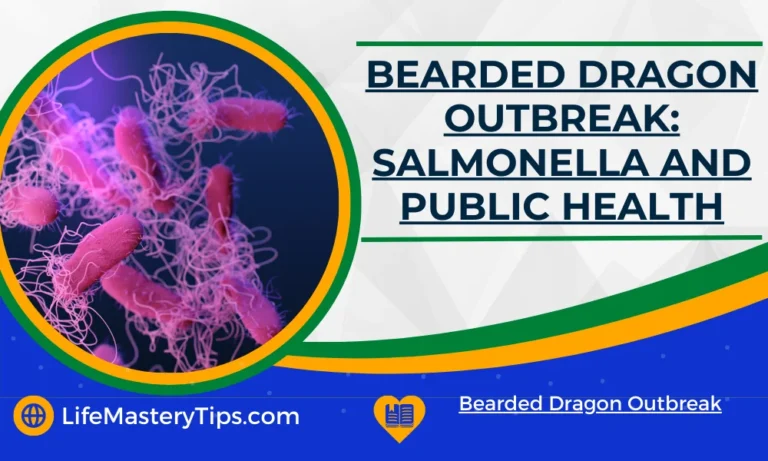Bearded Dragon Outbreak: Pet bearded dragons, beloved reptilian companions, have recently been associated with a salmonella outbreak. This article aims to provide essential information about salmonella, how it can be contracted from bearded dragons, its symptoms, treatment options, and preventive measures that can be taken to avoid infection.
What is Salmonella?
Salmonella is a type of bacteria that commonly causes food poisoning and gastrointestinal infections in humans. It can be found in various animals, including reptiles like bearded dragons. Salmonella can be present in the intestinal tracts of these reptiles without causing them any harm.
In October 2022, the Centers for Disease Control and Prevention (CDC) reported an outbreak of Salmonella infections associated with pet bearded dragons. As of January 2023, there have been a total of 32 reported cases, with 12 individuals infected by the Salmonella Vitkin strain and 20 individuals infected by the Salmonella IIIb strain. The illnesses have been reported across 20 different states. Out of the 24 cases with available information, 10 required hospitalization. The age range of affected individuals varied from less than 1 to 75 years old.
Salmonella is a type of bacteria that can cause food poisoning and is commonly found in the droppings of reptiles, birds, and other animals. Infection can occur when people come into contact with these animals or their droppings and fail to adequately wash their hands before handling food or eating.
Symptoms of Salmonella Infection
Symptoms of Salmonella infection may include fever, diarrhea, nausea, vomiting, and abdominal cramps. These symptoms typically appear within 12 to 72 hours after exposure and last for about 4 to 7 days. In some cases, Salmonella infection can lead to more severe complications such as sepsis, meningitis, and arthritis.
If you suspect you have been exposed to Salmonella, it is important to seek medical attention promptly. While there is no specific treatment for Salmonella infection, doctors can prescribe antibiotics to alleviate symptoms and prevent complications.
To protect yourself from Salmonella infection, it is recommended to:
- Thoroughly wash your hands with soap and water after handling reptiles, birds, or other animals, as well as their droppings.
- Avoid allowing reptiles, birds, or other animals to lick your face or hands.
- Keep reptiles, birds, and other animals out of the kitchen and food preparation areas.
- Ensure that fruits and vegetables are thoroughly washed before consumption.
- Cook meat, poultry, and eggs thoroughly, reaching an internal temperature of 165 degrees Fahrenheit.
If you own a pet bearded dragon, it is crucial to take preventive measures to minimize the risk of Salmonella transmission. These steps include:
- Thoroughly washing your hands with soap and water after handling your bearded dragon or cleaning its habitat.
- Keeping your bearded dragon’s habitat clean and free of droppings.
- Avoiding contact between your bearded dragon and your face or hands.
- Restricting your bearded dragon from freely roaming around your home.
- Keeping your bearded dragon away from the kitchen and other areas where food is prepared.
By following these guidelines, you can help protect yourself, your family, and others from Salmonella infection.
If you are considering getting a pet bearded dragon, it’s important to make an informed decision:
Choose an appropriate pet for your household Be aware that bearded dragons and other reptiles are not suitable for children under the age of 5, adults over the age of 65, and individuals with weakened immune systems. These individuals have a higher risk of developing severe illnesses caused by the bacteria that reptiles can harbor.
Conclusion | Bearded Dragon Outbreak
The bearded dragon outbreak linked to salmonella serves as a reminder of the importance of responsible ownership and vigilant hygiene practices. By understanding how salmonella is transmitted, recognizing the symptoms of infection, and implementing preventive measures, both bearded dragons and their human caretakers can enjoy a safe and healthy companionship. Together, we can mitigate the risks associated with this outbreak and ensure the well-being of all involved.




